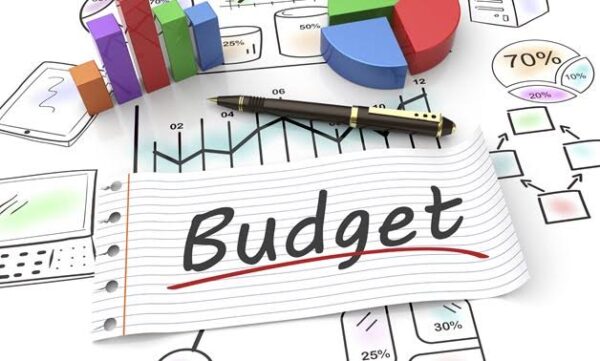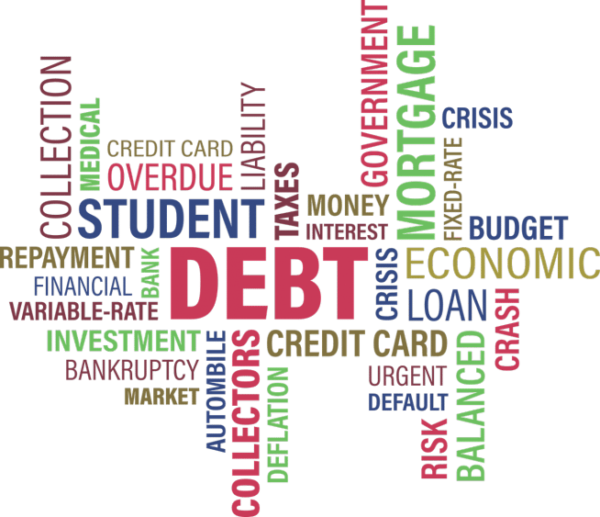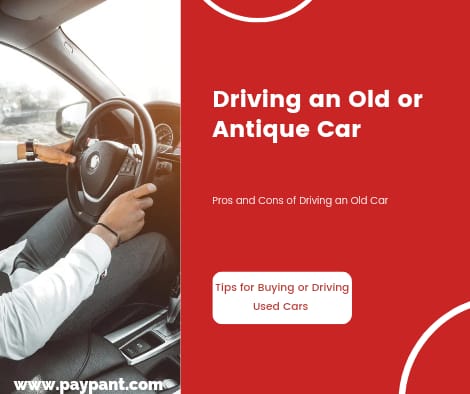Last updated Mar. 12, 2023 by Favour Chinaza
Bucket list destinations, next trip planning, family vacations, quitting your job to travel – we all have travel dreams and goals. However, we also have debts we need to pay off. But the question is, How do we pay off our debts and get to travel the world?
Statistics from financial experts show that the percentage of Americans in debt is around 80%.
It means that 8 in 10 Americans have some form of consumer debt, and the average debt in America is $38,000, not including mortgage debt.
The above is one of the scary money statistics that you don’t want to be part of. So, it should spur you on to pay your debts first, even if you want to travel the world.
Access Your Financial Situation before Travelling

If you have minor to manageable debt, such as college loans, a few credit cards, and possibly a loan for a vehicle or a house, the first step in planning a trip is to assess your financial situation.
You can’t do any of these things if you are worried about money, don’t have enough money to travel, or don’t know how to manage the money you do have.
Keeping track of your money is important no matter where you go or how long you will be gone.
By learning how to get out of debt, you’ll be able to do more in life, get rid of stress, and go on the trips you’ve always wanted to take.
This article will not delve into different ways you can get out of debt faster and have the opportunity to travel anywhere you want.
Related: Tally Review: Pay Off Debt Faster
Should I Pay Off my Debts First or Travel The World and Pay Later?

If you desire to travel the world but still have debts, the best thing is to focus on paying the debt first.
As soon as you have your finances under control, you can begin planning your extended trip by arming yourself with travel information you need like best travel insurance companies for travel and cheap alternatives to hotels when travelling.
What To Consider Before Paying off Your debt and Travelling the world.
The decision to travel while in debt is influenced by several factors, including:
- How much money do you owe in debt? Do you have a solid debt repayment strategy? Would you be able to keep it up despite the financial strain of this trip?
- What kinds of debt do you have? Credit cards, student loans, and mortgage payments are all examples of debt. If you have to make a list to remember them all, traveling might not be the best option right now.
- How much will your trip cost you, and how will it add to your debt? Determine an acceptable level of debt for your trip. Is there somewhere less expensive you could go? Is there a less expensive way to get there or a place to stay?
- How do you intend to fund your trip? If you put the trip on your credit card, are you confident you’ll be able to pay it off before accruing excessive interest?
- How badly would the trip jeopardize your payoff strategy? Sure, you want to enjoy yourself and your surroundings.
However, if you’re almost debt-free, consider postponing your trip for a few months or even a year. (Have you gone a year or so without going anywhere?)
In general, if you plan to travel while paying off debt, make sure you have a strategy in place to pay off your travel expenses as quickly as possible—especially if you’re using a high-interest payment method like a credit card.
Don’t go into credit card debt for a trip
Don’t go into credit card debt for a trip, even though it’s a great way to change yourself and have a great time.
It’s much better to plan for your trips and think about how they will fit into your life in the long run.
Compound interest is a great way to save for retirement, but it can be very bad for your long-term financial health if you have a lot of debt.
When you pay interest on interest, the situation gets out of hand over time. This is because a lot of credit card companies add interest every day.
That means your credit cards put you further in debt every day you travel.
Look at your debt and how it affects your life. If you have a lot of debt and it will take a long time to pay it off, think about other ways to pay more each month, like cutting costs or getting more money through second jobs and side hustles.
Ways to Pay Off Your Debt and Travel the World
Getting out of debt is usually hard, and COVID might make it even harder. Here are some ways that might work:
1. Create a Budget

If you want to make a financial decision like paying off debt, buying a home, or starting an investment plan, you must start with a budget.
You can start off with these easy and effective budgeting tips for beginners. Your budget considers all the money that comes in and goes out each month.
Spending falls into three categories:
- Fixed Expenses: that is (rent or mortgage, utilities, cable, cell phone, or any expense you pay each month that you can’t change for some time).
- Variable Expenses: that is (dining, entertainment, groceries).
- Debt Expenses: that is (credit cards and loans).
Set money aside in your budget for fixed expenses. These are the monthly payments you must make.
A good budget can help you make decisions as you devise a realistic plan for paying off your debt. Use this spreadsheet to plan how much you will spend each month.
Before making a budget, you need to know how much money you have coming in. Write down every source of income, big or small, including your gifts, money from side jobs, and unemployment benefits.
After you know how much money you make, you can think about how you will spend it. Certain costs, like a mortgage, insurance, child care, and internet access, are easy to plan for.
Food, gas, entertainment, clothes, and medical care can all cost different monthly amounts.
These are harder to plan a budget for, but if you look at your credit card and bank statements from the past, you can get a good idea of what you normally spend.
2. Establish a Debt Repayment Target You Can Meet

It is important, especially in light of COVID, to set a financial goal that is both realistic and attainable. We all need to be patient with ourselves and our money right now.
Don’t worry too much about how much debt you have. Instead, think about what you can pay each month based on how much money you have.
Trying to pay off $400 of your monthly debt seems much more doable than, say, trying to pay off $20,000 of debt.
With a debt calculator and some debt payoff apps, you can estimate your monthly payments and how long it will take to pay off the loan.
3. Implement a Plan to Pay off Debt
You may utilize the money you have to pay off the debt efficiently by using debt payback tactics like the debt snowball and debt avalanche.
You are paying the minimum amount due on your debts using both procedures. The distinction is in how you distribute more funds.
The debt snowball strategy generates momentum by emphasizing modest, early successes.
The debt with the lowest amount is the one you should pay off first with any spare money.
You start with the debt with the next-lowest balance once you pay off your smallest debt.
When you start coming close to fighting debts with higher amounts, paying off a bill in full early on helps keep you motivated.
4. Consider Your Student Loan Debt

Because of the COVID-19 economic crisis, the Department of Education announced that federal student loan borrowers would not have to pay back their loans for a while. The grace period is set to end on March 31, 2021.
Now is the time to start planning how to add these payments back into your budget.
Keep that March date in mind when making your monthly budget, but also look into your options for paying back your federal student loans.
For people who have lost their jobs, some programs let them pay back their debts in smaller amounts based on their monthly income.
Another option is to refinance federal loans, but doing so would mean losing federal student loan protections like the COVID forbearance.
Volunteer With a Service Program
One of the simplest ways to travel with student loan debt is by looking into service programs.
Depending on your loan type, you could volunteer with programs that allow you to live in different places while receiving student loan repayment assistance.
These programs may allow you to live in other states or countries while paying off your student loans.
While participating in these programs, your student loan payments may be paused or reduced to zero, and the government may pay for interest on federal student loans.
These programs enable you to travel, immerse yourself in a new culture, and live on a shoestring budget (including your student loans)
5. Reduce Spending to Pay Off Debt

With a low salary, figuring out how to get out of debt is difficult. Some “financial experts” may tell you to cut back on things like avocado toast and lattes, but it’s unlikely that these small changes will greatly impact your overall finances.
Before you can effectively work on your spending, you need to take note of these causes of overspending and how you can avoid it.
There are many ways to deal with your debt; some may work better than others. One way to do this is to cut back on how much money you spend every month.
Here is a list of eight things you could do, but remember that the best way to get out of debt for you will depend on your current financial situation.
Stop accumulating your debt.
Know how much you owe, Set up a budget, cut back on your spending, look for other ways to make money, use the debt snowball or debt avalanche method, and talk to your creditors about lowering your interest rates.
● Create a debt snowball
If you owe money on multiple credit cards and feel overwhelmed, you might want to create a “debt snowball” to help you get out of debt.
With this debt snowball method, you make the minimum payments on all of your biggest debts and then put any extra money you have each month toward your smallest debt.
As the smallest debt is paid off over time, the money going toward it is “snowballed” into paying off the next smallest debt, and so on.
The debt snowball method can be helpful because it helps people get rid of some of their smaller bills right away.
This can help you pay off your debts faster and reduce the monthly bills you must pay every month.
Can You Travel While in Debt?

You can pay down your debts while you travel. For example, you can sell your car and other things to pay off your credit card debt and clean your your bad credit.
You can also start a side hustle and use the extra money to pay off your credit cards with high-interest rates as quickly as possible.
Some people pay off all their credit cards except students loan before they travel. However, because a student loan is a low-interest debt, you can include it in your long-term travel budget.
People also work while traveling. If you do online jobs, your laptop is what you need to work from anywhere in the world. While working online, you can travel on a budget and pay off your student debt even faster than at home.
Understand your debt situation and value
Money and debt are very personal, but it’s important to take the time to understand your situation and what you value.
If you don’t have much high-interest debt, you might decide to pay off your student loans as little as possible over the next 20 years and start saving right away for a trip.
Or, if you have medical debt, paying it off could take years. In your case, it may be worth it to keep paying off the debt and start a travel fund.
This is a decision about values and lifestyle that is very personal to each person and each situation.
Don’t forget to delineate different debts before traveling.
No matter what you decide or your situation, you should have a better idea of how much debt you have, which debt is serious and should be taken care of before you travel, and how long it will take to pay off the serious debt.
Once you know how much debt you have and how to pay it off, you can start to save for a trip around the world. You can also use these savings tips to pay down your debt or build up a fund for emergencies.
If You Travel Abroad, What happens to your Unpaid Credit Card Debt?

It won’t go away even if you move abroad and don’t pay off your credit card debt. So the first thing that could happen is that your credit card company could sue you.
If you live abroad, this might not seem like a big deal, but it is. This is especially true if you are still in the country when the legal process starts.
If the credit card company goes through with its threat, a judge will probably rule against you.
If this happens, the credit card company in the United States can take money out of your bank account without your permission.
And if you work for a company based in the United States but live overseas, your wages can be taken until your debt is paid in full.
But what if you don’t have a bank account or work for a company in the United States? You might be able to start over without getting in trouble.
But if you leave anything of value behind, the court can take it, sell it, and give the money to the credit card company.
Your credit score will suffer
Assume you have nothing in the United States that the court or credit card company can seize.
Leaving the country with unpaid credit card debt can have unintended consequences.
Your credit score will suffer if you have outstanding credit card debt, whether you live in the United States or on the moon.
The good news is that your credit score from the United States will not follow you outside the country. You may also be owning the IRS for taxes or late filing.

You’ll have a debt collector after you
Your debt will most likely be sold to a collection agency in the future.
And once your debt is in their hands, you can expect relentless collection tactics. This includes calling, emailing, and attempting to contact you in any way possible.
While you’re out of the country, this may not seem like a big deal. However, if you decide to return, you may be sued and taken to court.
How to Pay off the Debt in Collections and Travel the World

Making a lump sum payment, sometimes called paying off all of your debt at once, is the fastest way to stop a collection.
This is usually the least expensive option, especially when it may give you the leverage you need to negotiate a lower payment.
To pay off collections, you need to be patient and persistent. You might have to work hard to pay off your debt and improve your credit score.
Still, the work will be well worth it in the long run if you think it will improve your long-term financial health.
If you are having trouble paying off a debt being collected on its own, you may want to look into getting a debt consolidation loan if your credit score allows it or if you can find a co-signer approved for the loan.
This won’t get rid of your debt, but it could lower the interest amount you have to pay and make the process easier for you.
No matter what payment method you choose, you should always verify your obligation and get the right paperwork to protect yourself now and in the future.
How to Pay off Debt with Low Income and Travel the World
It is possible to pay off low income debts and still travel the world. With a low salary, figuring out how to get out of debt is difficult.
Some “financial experts” may tell you to cut back on things like avocado toast and lattes, but it’s unlikely that these small changes will greatly impact your overall finances.
There are many ways to deal with your debt; some may work better than others. One way to do this is to cut back on how much money you spend every month.
Keep in mind that the best and fastest way to get out of debt so you can travel will depend on your current financial situation.
Stop adding to your debt, know how much you owe, plan how you will spend your money, cut back on your spending, look for other ways to make money, and use either the debt snowball or debt avalanche method to pay off your debt.
How to Pay off the Debt in a Year and Travel the World

Paying off your debt within a year and traveling the world is possible. In addition, most credit card companies only require you to pay about 2% of the monthly balance.
If you put at least 15% of your salary (or income from Social Security or pensions) toward credit card debt and loans, you can pay them off much faster.
It would be best if you weren’t afraid to spend money to pay off debts with high-interest rates.
Try to get the interest rate lowered. For example, spending your tax return on a big-ticket item or a trip might be tempting, but using the money to pay down or get rid of your debt would be better.
It would be best if you listed things you can sell at a garage sale or on sites like eBay and Craigslist.
To get money out of your life insurance policy, If you want to get rid of that debt this year, you’ll need to find ways to make more money so you can put that money toward your bills.
Move the remaining balance on your credit card, and people will sometimes keep paying old credit card bills for a long time after they are no longer required to do so by law.
How to Travel on a Budget

Let’s be honest: One article you read on the internet will not force you to cancel your travel plans, regardless of the financial difficulties it may cause.
So, if you’re going to read about the consequences and still do it, here are some tips for traveling while in debt.
● Create a travel budget.
Separate it into the following categories: transportation, lodging, activities, food/drink, souvenirs, and miscellaneous. Then, if necessary, break down your budget by day.
You should be able to stick to your overall budget for the trip if you set a daily spending limit.
● Check out offers and local prices.
How can you budget effectively if you don’t know how much things will cost when you arrive?
Know what you’re getting into, and look for ways to save on transportation, lodging, and must-see attractions. You can also use smart travel apps to help you plan your trip.
● Use travel rewards if you can.
If you have a large credit card balance, please inform me that you have been earning points as you spend.
Many credit cards offer rewards for spending, and you can use those points or miles to help fund your trip—and your points may be worth more when redeemed for travel.
I have used my points twice to fly to Ohio for Christmas and didn’t pay a dime. So, it is possible to fly just with your points.
● Be Flexible
If you want to find the best deals on travel, you’ll often have to be flexible with your plans, like flying out in the middle of the week or going during the off-season.
During the off-season, when flight demand is low, prices go down, and you could save hundreds of dollars on your flight.
Every place has a busy time of year, and this is when it costs the most to travel there.
Also, remember that travel prices are highest around holidays like Christmas when airlines make the most money. So the more people who want to buy a ticket, the more it will cost.
Sign up for airline newsletters to learn about current deals and special offers. You can know about many great deals on flights through airline newsletters.
● Be open-minded
If you’re on a budget, you have to be realistic about what’s feasible and what’s not.
You can’t be too picky about flight times, airlines, or even hotels/rentals when trying to spend as little as possible.
Sometimes the cheapest option is not the best; you may have to sacrifice comfort/luxury for financial security.
These frugal travel blogs can assist you in finding innovative ways to save money.
● Don’t leave out Health Insurance
If you’re traveling while in debt and money is tight, you might be looking for ways to save.
But it would be best if you never skimped on international health insurance, and anyone who tells you that you can save money by traveling without it is a horrible person.
If you get stuck in the Amazon and need an airplane to get you out, you should send them a bill for $50,000.
International health insurance is one of those things you never want to know how important it is, but if you do, you don’t want to be sorry you didn’t take it seriously at the time.
There are best places to open a health savings account and you can tow that path.
Because if something goes wrong while you’re traveling and you’re in debt, you’ll quickly go from debt to bankruptcy.
I also don’t know how to travel while going through bankruptcy. Anything can happen to you during travel. You just don’t want to end up with a broken nose and no health insurance.
Is Traveling the World for You?

Setting up a plan to pay off your debt is a good idea, but you need to be patient with yourself as you go through the process.
If something unexpected comes up while you are traveling, it is fine to change your plans as needed.
These tips can help you make a realistic plan, put you in a good position to succeed, and keeps you motivated to keep going.
Making a plan to pay off your debt is a good idea, but you need to be patient with yourself as you work through the plan.
You can change your plans if something you didn’t expect happens on your trip.
You come up with a plan that works, and which puts you in a position to be debt free, while traveling the world.
Related: 10 Best Travel Insurance Companies
Bottom Line
Traveling is more than just getting to a place, taking pictures, or crossing things off a list. I’ve learned a lot of life lessons from traveling. There’s no reason why travel can’t teach us about money.
Many of us have to wait years to travel or go to that place we’ve always wanted to see. The same is true for having enough money.
Don’t forget that getting out of debt affects more than just your trips. You are free to live and travel when you pay off your debt. So get rid of your stress, go on trips, and learn to handle your money better.
Now is the best time to start if you want to get out of debt and travel more.
Frequently Asked Questions
Q: Can I travel if I have debt?
If you leave the country and continue to incur debt, technically, nothing changes. Your creditors and collectors will not stop attempting to get their money back from you since it is still your debt. Phone calls and snail mail may be used, just as they were in the past.
Q: What is the smartest way to pay off debt?
The smartest way to eliminate debt is to follow the avalanche method, which lists your debts from highest to lowest by interest rate. First, pay the minimum balance on each, then allocate as much extra money as possible to the one with the highest interest rate each month.
Q: Should I go on a trip or pay off debt?
Don’t go into debt to pay for a vacation. You could also use the money you would have spent on a trip to pay down debt, save for an emergency, or invest for the future. Instead, it would be best if you took some time to unwind. However, you should not put your long-term financial stability at risk in order to take a costly trip.
Q: Will my debt follow me to another country?
However, your outstanding obligations will remain in effect even if your credit history does not accompany you to your new country. Lenders will have a difficult time collecting a loan from you if you have moved to a foreign country, but they will not give up trying.
Q: Can debt collectors chase you overseas?
A judgment is required for a creditor to place a lien on your property and garnish your accounts. Although creditors do not have legal standing to prevent you from leaving the country, they may prevent you from taking any of your belongings with you.
Q: What debts should I pay off first?
Prioritize eliminating the debt with the highest interest rate first since this kind of obligation costs you the most money in interest payments.







